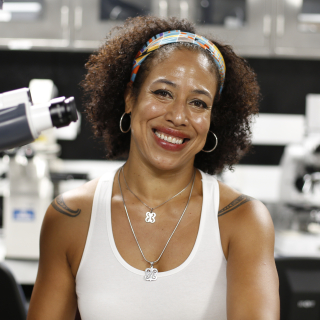From Microbe to Mind: The Saga of a New Gene in Remembrance and Reproduction

Description
Cassandra Extavour is Professor of Organismic and Evolutionary Biology and Director of the Extavour Lab at Harvard University. After earning a Ph.D. at the Autonomous University of Madrid, Dr. Extavour performed postdoctoral work first with Michalis Averof at the Institute for Molecular Biology and Biotechnology in Crete, Greece, and subsequently with Michael Akam at the University of Cambridge. At Cambridge she received a BBSRC Research Grant and became a Research Associate in the Department of Zoology. In 2007 she established her independent laboratory at Harvard University. Her research investigates early embryonic development, the genes that control this development, the evolutionary origins of these genes and how their functions have changed over evolutionary time. Dr. Extavour is particularly interested in the development and evolution of reproductive systems, including both germ cells, which are cells that make eggs and sperm in sexually reproducing animals, and somatic gonad cells, which create the structures to house and protect the germ cells, and regulate egg and sperm production. Outside the lab, Dr. Extavour has been a musician and performer since the age of five, and a professional classical singer since her undergraduate days in Toronto. Go to her musical website to read more about her musical career.
Abstract
Animals are capable of an astonishing array of complex behaviors that appear absent in single celled organisms. Evolving these behaviors was possible largely thanks to the emergence of new gene regulatory networks that control the production, connectivity and functions of their neurons. Where did the genes in these networks come from? Some of them were present in the single-celled eukaryotic ancestors of animals, but others appear entirely novel, with no closely related genes found in any other life form. We have found evidence for a surprisingly widespread phenomenon whereby new genes are created by fusing fragments of bacterial and eukaryotic genes together, generating novel chimeric genes in the genomes of a broad range of complex organisms. We also find that a gene long considered a unique and exclusive regulator of reproduction in fruit flies, is actually one such chimeric gene with partial bacterial ancestry. Moreover, we find evidence that when this gene was first born, its original function was in the nervous system, potentially as a regulator of long-term memory. We use a series of biochemical and computational assays to explain how evolving subtle changes to the properties of the chimeric protein allowed the protein to move from its role in the nervous system, to occupy a new role in reproduction.
This lecture will take place at 4 pm in Psychology 1312 on the UCSB campus and is free and open to the public.
